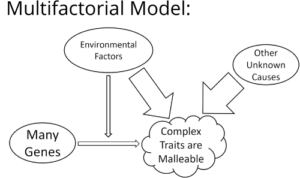Humane Genetics
What role could biology education play in reducing prejudiced thinking?
Project Purpose:
Racism is a persistent problem in the United States. Throughout history, individuals have misunderstood how genes affect complex human traits. Some have used inaccurate ideas about genetics to justify policies that contribute to racism. Others have argued incorrectly that it is futile to address racism because racial inequality is in our genes and is therefore natural and unchangeable.
The Humane Genetics project explores the role biology education can play in tackling this problem. We aim to teach a more scientifically accurate model of genetics and refute racist thinking.
Our Work:
In our early research, we discovered that biology education leads students to believe three misconceptions:
- People of the same race are genetically uniform.
- People from different races are categorically different.
- Genes are the most powerful and important cause of complex human traits.
When biology education causes students to believe these misconceptions, it increases racial prejudice.


This made us wonder, could biology education also play a role in decreasing racial prejudice? Specifically, we wondered whether moving away from an oversimplified Mendelian model of genetics in favor of a more scientifically accurate, multifactorial model of genetics could reduce racial prejudice among students.
We designed the Humane Genetics unit – which presents population and multifactorial genetics with a specific goal of refuting racist thinking. We tested the effectiveness of this unit through a series of randomized controlled trials with middle and high school biology teachers.
And we found that yes – teaching a more scientifically accurate model of genetics can reduce the development of racial prejudice among students.
Read published findings here.
In recent years, we have prepared middle and high school biology teachers across the country to implement this approach in their classrooms. This is challenging work, and it takes courageous teachers to make it happen. Learn more about their stories here.
What’s Next:
We are working on improving the Humane Genetics curriculum by testing if the addition of a reasoning with evidence framework improves student learning. While teaching students how to reason with evidence could help them to refute racially prejudiced arguments, it could also strengthen some students’ ability to argue for these same prejudiced ideas.
We are interested to see whether our revised curriculum is less, similarly, or more effective in reducing racist thinking among adolescents than our original curriculum.
About the Grant:
Title: Reducing Racial Prejudice by Fostering an Ontologically and Epistemologically Complex Understanding of Human Genetics Research
Partners: Dr. Robbbee Wedow, Broad Institute
This work is supported by the National Science Foundation under Award No. 1660985.